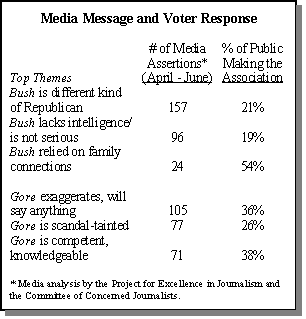Introduction and Summary
American voters, who continue to divide their support equally between Al Gore and George W. Bush, have not been strongly influenced by the way the American news media have covered the personal character of the presidential candidates. As the conventions approach there is ample opportunity for the campaigns to make powerful appeals to the American public that could greatly shape public opinion, as only one-in-four voters say they know a lot about what each of the candidates stand for.
 But voters may put off learning about the candidates until the fall. Only 34% of the public is interested in following what happens at the Republican Convention in Philadelphia next week. That is considerably less enthusiasm for the conventions than was voiced in Pew Research Center surveys taken at comparable points in the campaigns of 1996 (44%) and 1992 (53%).
But voters may put off learning about the candidates until the fall. Only 34% of the public is interested in following what happens at the Republican Convention in Philadelphia next week. That is considerably less enthusiasm for the conventions than was voiced in Pew Research Center surveys taken at comparable points in the campaigns of 1996 (44%) and 1992 (53%).
The latest nationwide survey also found neither candidate strongly associated with the principal character themes emphasized in reporting on the candidates since the primary season ended. Only one-third of Americans see Gore as the candidate who will say what’s popular rather than what he really believes. One-in-five regard Bush as a “different kind of Republican.” These were the two most common character themes reported by news organizations between April and June, according to a joint analysis by the Project for Excellence in Journalism and the Committee of Concerned Journalists, which studied more than 2,000 selected news stories, broadcasts and cablecasts compiled over a five-month period.1
The vice president’s competence and knowledge, often emphasized in the media, rang a bell with 38% of the public. But only 26% identified him as scandal-tainted, another common media portrayal. Bush is not singled out by voters as the “candidate who is not a serious person,” which clearly has been a strong component of the Bush coverage. But 57% of the public view him as having relied on family connections to get ahead — a subject that has received only modest mention in the media.
Although there is little indication so far that opinions have been decisively shaped by campaigns or the press, the potential to change voter perceptions is apparent in the Pew survey results. Gore seems more vulnerable to a negative attack than Bush. Approximately half the public says they would be less likely to vote for the vice president if they heard charges that Gore panders or stretches the truth. Messages that emphasize scandals involving President Clinton or allegations about Gore’s own role in illegal fund-raising would turn off about four-in-ten Americans. Bush would be hurt most by the charge that he does not know enough about the issues. His family advantages, while widely perceived, and claims that he is linked to the right-wing of the GOP would be somewhat less potent.
Bush has a number of potentially powerful campaign themes: his education record, pledge to cut taxes, attempts to reach out to minorities and vows to improve the moral climate in the White House all get a good response from voters. Gore’s experience and knowledge of the issues are by far his strongest messages.
The Pew survey, conducted July 19-23 among a national sample of 1,204 adults and 918 registered voters, was taken before Dick Cheney was announced as Bush’s running mate. However, the poll did find many voters saying that a candidate with extensive Washington experience and foreign policy experience would add appeal to the GOP ticket. Both qualities, which are widely regarded as the former defense secretary’s strong suits, spark a more positive response than would a selection based on gender or a candidate’s stand on abortion.
Although just 36% approve of the performance of the Republican congressional leaders, compared to 46% who disapprove, the survey found little indication that the battle over control of Congress is resonating with the public. Fully half of all voters say that which party controls Congress is not that important in deciding which candidate to support, while fewer than one-in-five say national issues rank as the biggest factors in their voting decisions.


